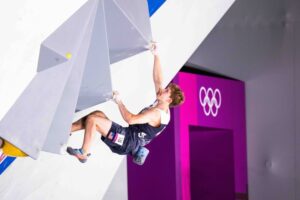
How to watch? Check out this article by the Olpmics that includes the climbing schedule
Rock climbing made its Olympic debut at the Tokyo 2020 Summer Olympics, bringing this exhilarating sport to a global audience. And now it’s making an appearance again in Paris! If you’re new to watching rock climbing at the Olympics, here’s a guide to help you understand and appreciate the excitement.
1. The Three Disciplines
Rock climbing (at the Olympics) consists of three distinct disciplines: Speed, Bouldering, and Lead. Each discipline tests different skills and offers unique challenges.
- Speed Climbing: Two climbers race against each other on a standardized 15-meter wall. It’s all about speed, agility, and precision, with athletes ascending the wall in mere seconds.
- Bouldering: Climbers tackle several short but complex routes (called “problems”) on a 4.5-meter wall without ropes. Each problem requires a combination of strength, technique, and creativity. Climbers have a limited time to complete as many problems as possible.
- Lead Climbing: Climbers attempt to climb as high as possible on a 15-meter wall within a set time. They are clipped into a rope for safety, and the routes are longer and more endurance-based compared to bouldering.
2. Scoring System
In the Paris 2024 Olympics, rock climbing will feature a combined format of Bouldering and Lead climbing, while Speed climbing will be a separate event. Here’s how the scoring works for each discipline:
Bouldering and Lead Combined Format
- Bouldering:
- Climbers will tackle four boulder problems.
- Points are awarded as follows: 25 points for a top (completing the problem), 10 points for reaching the second zone hold, and 5 points for the first zone hold.
- Each failed attempt deducts 0.1 points from the climber’s score, but deductions only apply to the highest point reached on that problem (Psychi) (Boulder Flash).
- Lead Climbing:
- Climbers aim to ascend as high as possible on a 15-meter wall.
- Points are awarded based on the highest hold reached: the top 10 holds are worth 4 points each, the next 10 are worth 3 points each, and so on, with the lowest 10 holds worth 1 point each.
- If a climber falls while attempting a move, they receive an additional 0.1 points for their effort (Psychi) (Boulder Flash).
- Combined Scoring:
- The scores from both Bouldering and Lead disciplines are added together to determine the final score.
- The maximum possible score is 200 points, simplifying the scoring compared to the multiplication method used in Tokyo 2020 (Psychi) (Boulder Flash).
Speed Climbing
- Climbers race side by side on a standardized 15-meter wall.
- The event includes seeding rounds followed by elimination rounds (quarter-finals, semi-finals, and finals) to determine the final placements (Psychi) (Boulder Flash).
This new format aims to make the scoring system more straightforward and easier for spectators to follow. For more detailed information, you can check out sources like BoulderFlash and Psychi (Psychi) (Boulder Flash).
3. Key Terms and Techniques
Familiarizing yourself with some key terms and techniques will help you follow the action more closely:
- Crux: The most difficult section of a climb.
- Dyno: A dynamic move where the climber jumps to reach the next hold.
- Beta: Information about how to complete a route or problem.
- Flash: Completing a route on the first attempt without prior practice.
- Top-Out: Finishing a bouldering problem by climbing over the top of the wall.
4. Athlete Profiles
Keep an eye out for standout athletes. In the Tokyo Olympics, athletes like Janja Garnbret from Slovenia and Adam Ondra from the Czech Republic made headlines. Following their stories and achievements can add a personal connection to the competition. The Climbing Business Journal released this article to showacase 2024 Olympic athletes including Jesse Grupper, Brooke Raboutou, and others!
5. The Role of Strategy
Strategy plays a crucial role in rock climbing. In Bouldering, climbers must decide which problems to attempt first and how to conserve energy. In Lead Climbing, they need to pace themselves to avoid fatigue before reaching the top. Speed Climbing demands a perfect balance between speed and precision.
6. Physical and Mental Challenges
Rock climbing is as much a mental sport as it is physical. Climbers must solve complex problems under pressure, making split-second decisions on the best moves to make. Watching their mental resilience and problem-solving abilities adds an extra layer of intrigue.
7. Safety Measures
Safety is paramount in rock climbing. All climbers use specialized equipment like harnesses, ropes, and crash pads to prevent injuries. The walls are designed to meet stringent safety standards, ensuring a safe environment for these high-stakes competitions.
Conclusion
Watching rock climbing during the Olympics offers a thrilling blend of speed, strength, strategy, and skill. By understanding the different disciplines, scoring system, key terms, and the athletes’ physical and mental challenges, you can fully appreciate the excitement and nuances of this dynamic sport. So, tune in, cheer for your favorite climbers, and enjoy the breathtaking feats of athleticism and determination on display.
Photo credit: https://www.climbingbusinessjournal.com/less-than-200-days-until-paris-2024-meet-the-sport-climbing-athletes-who-have-qualified-so-far/


